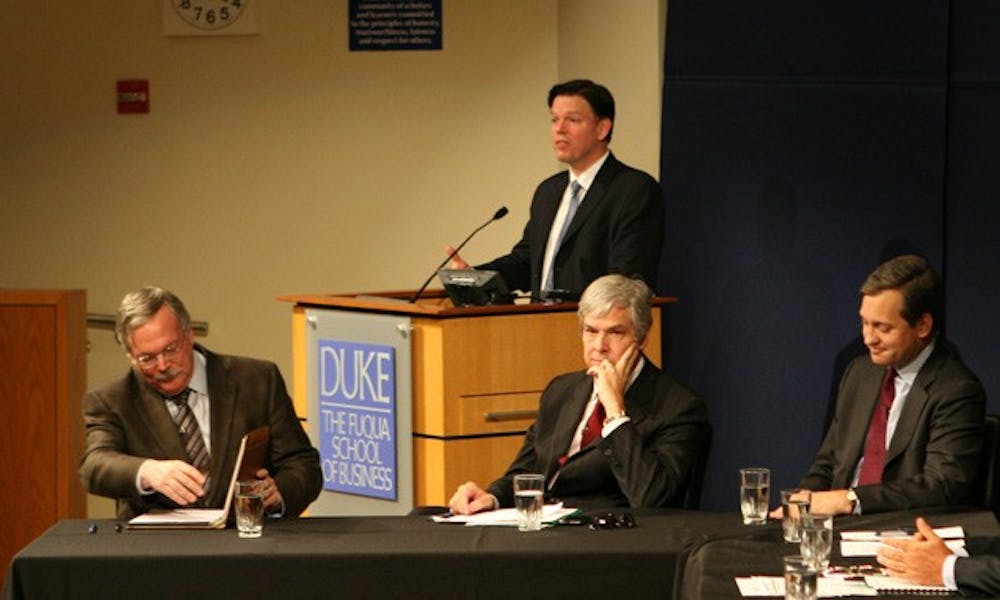Even the corporate world cannot escape the increasing demand for environmental sustainability.
A panel of five leading executives and energy experts discussed how to satisfy the demand for energy while considering mounting environmental concerns Thursday night in Geneen Auditorium in the first of a four-part series titled “The Future of Capitalism: Building a Sustainable Energy Future.”
A collaboration among the Fuqua School of Business, the Nicholas Institute for Environmental Policy Solutions and McKinsey & Company, a worldwide management consulting firm, the discussion focused on energy’s changing role in the private sector. Fuqua Dean Blair Sheppard explained the issues at stake.
“The answer to the energy problem is through the innovation of the market,” he said. “As for the panel, we looked for people in the middle of it, and who don’t agree on the answer. This is not meant to be polite—it’s meant to be real.”
The panel consisted of Tom Albanese, CEO of mining company Rio Tinto, Aubrey McClendon, Trinity ’81 and CEO of natural gas producer Chesapeake Energy, George McLendon, chairman of PTP Energy and dean of the Trinity College of Arts and Sciences, Scott Nyquist, managing director of McKinsey’s Energy Practice and William Timmerman, Trinity ’68 and CEO of SCANA Energy.
Industry leaders are concerned about long-term issues like global warming. But many consumers are simply worried about paying their electric bills, Timmerman said.
“For most folks in NASCAR Nation, they don’t care about what happens 40 to 50 years from now, it’s about what’s happening two weeks from now,” he said. “Affordability is first and foremost in my mind. What we need is a workable answer for the bulk of society.”
Similarly, Naquist explained that if a developing country has access to coal, the nation is going to use it—regardless of carbon emissions—if that is what it takes to get the country going.
Although each panelist supported a different energy source as the solution, they agreed that oil is not part of energy’s future and that transportation reform is key to achieving true sustainability.
The panelists also noted that China is consuming oil almost as fast as the United States, but is developing nuclear power much quicker. The Chinese will build 100 nuclear power plants in the next year, due to its streamlined regulations.
“None of us like the way they run their country,” Timmerman said. “But this is what they’re doing.”
Toward the end of the discussion, after taking questions from the audience, the panelists called for university involvement in solving the energy crisis.
“The U.S. university system should be on the forefront of this,” Albanese said. “It’s the best in the world.”
Students, who were well represented, said they found the discussion enlightening.
“The most interesting part for me was getting all those different points of view in one place,” said Chris Greene, a student in Fuqua.
In an interview after the discussion, Timmerman said the energy debate is so challenging because issues of long-term importance must be dealt with in light of short-term political concerns.
“Most energy decisions made in politics are made with a short-term focus and driven by the election cycle. It’s a political issue,” he said. “I don’t know how to fix it. I wish I did. I’d make a lot of money.”
Get The Chronicle straight to your inbox
Signup for our weekly newsletter. Cancel at any time.

